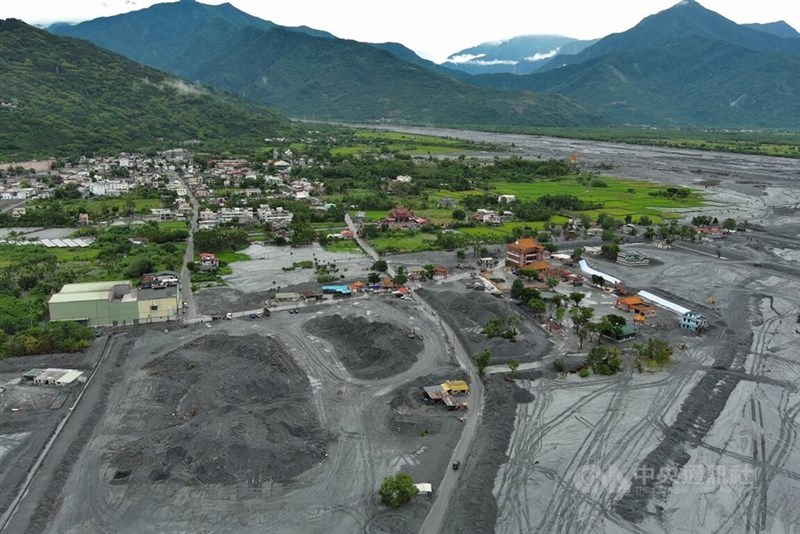
Taipei, Oct. 30 (CNA) Lawmakers from Taiwan's three major parties have agreed on a draft special bill for reconstruction in areas impacted by flooding caused by a barrier lake that formed in eastern Taiwan in late September, though local Indigenous residents are calling for an alternative solution.
The approved version earmarks NT$30 billion (US$977 million) to assist residents of Hualien County's Guangfu Township rebuild and restore their lives, with work expected to be mostly completed by April 2027, the opposition Kuomintang (KMT), which proposed the draft, said in a press release Thursday.
The banks of the Matai'an Barrier Lake in Hualien County burst on Sept. 23 after record rainfall brought by Typhoon Ragasa, sending 60 million tons of water and debris through Guangfu Township within two hours, killing at least 19 people.
The KMT's proposed bill met no objection during cross-party negotiations held Thursday afternoon, which were also attended by the ruling Democratic Progressive Party (DPP) and the Taiwan People's Party (TPP).
According to the KMT's statement, the special bill -- once passed on Friday -- would be Taiwan's first to address a barrier lake-related disaster, which left more than 600 hectares of land in Guangfu, Fonglin, and Wanrung townships buried under mud.
However, before the negotiations, youth representatives from local Amis (or Pangcah) villages gathered outside the Legislative Yuan in Taipei to voice their opposition to the KMT proposal.
Namoh Nofu, one of the demonstrators, called the draft "heartless," saying they opposed relocating communities elsewhere and instead preferred to rebuild their homes on the original site while temporarily living in transitional shelters.
He cited the tragedy of Siaolin Village in Kaohsiung, which was completely buried by a landslide during Typhoon Morakot in 2009, scattering residents across three separate locations and preventing them from returning home.
Another demonstrator, Lisin, said the communities' opinions were not respected at a meeting held Monday by KMT lawmakers Fu Kun-chi (傅崐萁) and Sra Kacaw (鄭添財).
"We had no idea the event was about the special bill," she said. "We were stopped from entering the venue at first and only got in two to three hours later, but they weren't even talking about the bill."
In its statement, the KMT said Han and Indigenous villagers accounted for about half of the residents each in the affected area, and the bill must comply with the Indigenous Peoples Basic Law by fully consulting with local communities. It pledged to respect residents' wishes and prioritize their rights when arranging relocation and shelter.
Asked to comment on the proposed bill, Huang Shu-mei (黃舒楣), an associate professor at National Taiwan University's Graduate Institute of Building and Planning, said placing affected people in temporary shelters is an international standard post-disaster measure, warning that the villagers would lose ownership of their land should they move into permanent housing elsewhere.
Accusing the KMT of rushing the bill to shield itself from future liability for typhoon-related disasters, Huang urged lawmakers not to repeat the mistakes made during Typhoon Morakot. "If they don't handle it properly this time, the same errors will occur again when we have the next disaster," she said.
Chang Yu-chuan (張育銓), a professor in the Department of Public and Cultural Affairs at National Taitung University, added that the Amis people have deep ties to their land, and forcing them to relocate permanently would mean "uprooting them and leaving their tribe, community, and culture without roots."
-
Politics
Taiwan-U.S. trade deal still in limbo: Premier
03/03/2026 01:06 PM -
Business
Taiwan's consumer confidence weakens slightly in February
03/03/2026 11:07 AM -
Business
U.S. dollar higher in Taipei trading
03/03/2026 10:42 AM -
Culture
Mandopop singer Sun Yanzi to perform at Taipei Dome in May
03/03/2026 10:22 AM -
Society
Heavy rain advisory in effect for Nantou County
03/03/2026 10:16 AM